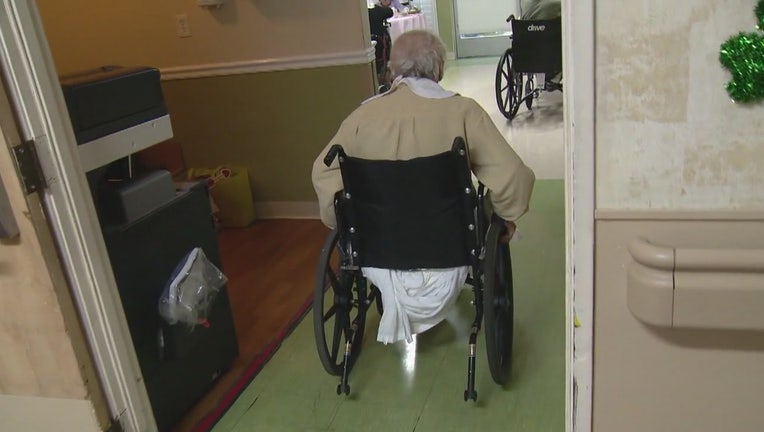State expands nursing home visitation

TALLAHASSEE, Fla. - Despite a steadily growing number of COVID-19 cases in Florida communities, Gov. Ron DeSantis on Thursday announced the state will begin allowing outdoor visitation at long-term care facilities, regardless of whether the facilities have COVID-19 infections.
Indoor visitation at nursing homes and other facilities will still be tied to COVID-19 infection rates of facility residents and staff members.
The state changes will also allow children to visit long-term care residents, with the governor noting during an appearance in Fort Myers that children “aren’t particularly vectors.”
The changes came less than two weeks before the Nov. 3 general election, when voters will consider candidates --- ranging from candidates for president to congressional and legislative seats --- through a COVID-19 lens that includes how to balance a return to normalcy with public health and safety.
Florida barred visitors to nursing homes and assisted living facilities in the spring to try to prevent spread of the deadly virus. But the DeSantis administration on Sept. 1 issued an executive order authorizing visitation to resume and providing broad guidelines that nursing facilities were required to follow.
PREVIOUS: Families welcome chance to see loved ones in nursing homes, despite restrictions
The executive order authorized general indoor and outdoor visitation at long-term care facilities so long as the facilities had gone 14 days without any new cases of COVID-19 among residents and staff. General visitors were required to wear masks and to maintain social distance.
The executive order authorized nursing homes to identify certain “essential” and “compassionate” caregivers who were authorized to visit regardless of COVID-19 infection rates.
During the appearance Thursday in Fort Myers, DeSantis reiterated his view that it is important for residents of nursing homes and assisted living facilities to have visits from family members.
“I think the families have just universally been very, very happy with being able to be reunited with their loved ones,” DeSantis said. “And I hear people say, “Oh, well, you know, you shouldn’t have Thanksgiving this year.’ … And I'm just thinking to myself, you know, shouldn’t individuals be in the position to be able to make those determinations? And if a family is in a situation where they are behaving in a safe way and the facilities are doing what they need to do, we need to be able to have family connections. This is very, very important.”
RELATED: Married for 60 years, couple's seven-month COVID separation ends with tearful reunion
DeSantis touted the state’s efforts to keep COVID-19 out of nursing homes. As of Wednesday, state data showed a less than 1 percent positivity rate at nursing homes and assisted living facilities, or that 807 of 138,678 long-term care residents were positive for the virus.
However, the state isn't including in its calculations 5,214 positive long-term care residents who have been transferred from their facilities. When those residents are included, the positivity rate is 4.3 percent.
Also, third-party data paint a less-rosy picture than data produced by the Florida Department of Health.
AARP issued a “dashboard” this month showing that 1.38 of every 200 nursing home residents in Florida died from COVID-19 during a four-week period ending Sept. 20, compared to one of every 200 residents nationally.
The AARP data also showed that the rate of infected nursing-home residents in Florida was 4.5 percent, compared to 2.6 percent nationally. Moreover, the rate of infected staff members in Florida nursing homes was 3.9 per 100 residents, exceeding the national average of 2.5 per 100 residents.
PREVIOUS: Nearly 40 coronavirus-related deaths occurred among six nursing homes in Manatee, Sarasota counties
As of late Thursday afternoon, the state had not issued a new executive order detailing the changes to the visitation policy.
DeSantis said the new order will also clarify that “compassionate” caregivers --- or visitors who are there to console residents because of life-altering events --- don’t have to abide by social distance requirements.
DeSantis said there was confusion in some areas of the state about whether that was the case. The visitation policy allows “essential” and “compassionate” caregivers to touch residents.
Meanwhile, DeSantis said the state was making changes related to outdoor visitation because the chances of spreading the virus in such settings were lower.
“The reason for that is we just don’t have very many cases that get linked to outdoor activity. I'm not saying it can’t happen. Obviously, it could happen under the right circumstances,” DeSantis said. “But being outdoors is something that has been very positive.”
RELATED: Federal health officials planning to get coronavirus shots to nursing homes
DeSantis also used the appearance to reiterate a commitment to sending a portion of rapid testing kits the state is getting from the federal government to assisted living facilities to test staff members and visitors for the virus.
Produced by Abbott, the BinaxNOW COVID-19 Ag Card delivers test results in 15 minutes. But the rapid antigen tests are only recommended for use on symptomatic people and aren’t as reliable as other tests. Because of those limitations, Florida Surgeon General Scott Rivkees has said the tests aren’t a good use for visitation.
But DeSantis on Thursday said it was a good use of the supplies, calling it “testing with a purpose.”

